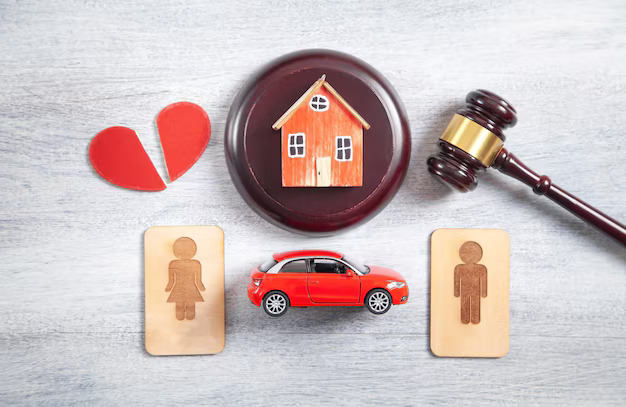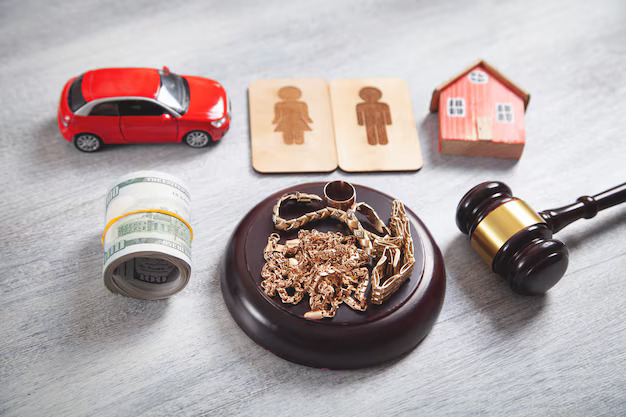Divorce is a challenging phase in anyone’s life, marked by emotional turmoil and legal complexities. One of the most contentious issues during a divorce is the division of assets, especially the family home. The question, “Can I keep my house after divorce?” is a common concern for many individuals navigating this difficult process. At Noida Lawyer, we specialize in providing expert guidance and support in divorce cases, helping you understand your rights and options. Our team of 14 experienced professionals, certified by the Bar Council of Uttar Pradesh and the Bar Council of India, is here to assist you every step of the way.
Understanding Property Division in Divorce
In India, property division during a divorce is not as straightforward as splitting it equally between spouses. The process is governed by personal laws, which vary depending on religion and other factors. Here’s a breakdown of how property division works:
Marital Property vs. Personal Property
Marital property includes assets acquired during the marriage, which may be subject to division.
Personal property refers to assets owned individually before the marriage or acquired through inheritance or gifts.
Contribution to Property
The court considers the financial and non-financial contributions of both spouses towards acquiring and maintaining the property.
Non-financial contributions, such as homemaking and childcare, are increasingly being recognized.
Ownership Documents
The title deed plays a crucial role in determining ownership.
Joint ownership generally implies shared rights, while sole ownership may favor the person whose name is on the title.
Mutual Agreement
Spouses can reach a mutual agreement regarding property division, which the court can formalize.

Factors That Influence Who Gets the House
When determining who gets to keep the house, courts consider various factors to ensure a fair resolution:
Best Interests of Children
If children are involved, the custodial parent may be allowed to retain the house to provide stability.
Financial Capacity
The ability of each spouse to afford mortgage payments, maintenance, and other expenses associated with the property.
Ownership and Contributions
Ownership documents and contributions made by each spouse toward acquiring and maintaining the property.
Alternative Housing Options
Availability of alternative housing for both parties is also a significant consideration.
Steps to Determine Your Chances of Keeping the House
Review Ownership Documents
Check the title deed to understand ownership status.
If the house is jointly owned, you may negotiate a buyout.
Assess Financial Feasibility
Evaluate your ability to afford the house independently.
Consider factors like loan EMIs, maintenance costs, and taxes.
Seek Legal Advice
Consult with a divorce lawyer in Noida to understand your legal standing.
A skilled lawyer can help you present your case effectively in court.
Negotiate with Your Spouse
Aim for an amicable settlement to avoid prolonged legal battles.

Options for Retaining the House
If you wish to keep the house after divorce, here are some possible options:
Buyout
Buy out your spouse’s share of the property.
This option requires financial readiness and may involve refinancing the loan.
Mutual Settlement
Negotiate a settlement where you retain the house in exchange for other assets.
Co-Ownership
Agree to co-own the property, especially if children are involved.
Clearly define responsibilities and exit strategies in a legal agreement.
Court Decision
If mutual agreement is not possible, the court will decide based on the evidence and circumstances presented.
Legal Support from Noida Lawyer
Navigating property division requires expertise and experience. At Noida Lawyer, we understand the complexities of divorce law and are committed to providing personalized legal solutions. Here’s how we can help:
Expert Guidance
Our team of best divorce lawyers in Noida and Greater Noida will analyze your case and provide tailored advice.
Strategic Planning
We develop a strategic approach to present your case effectively, considering your financial and emotional well-being.
Negotiation Support
We assist in negotiating amicable settlements with your spouse to save time and resources.
Court Representation
If the case goes to court, our experienced advocates will ensure your rights are protected.
Emotional Considerations in Keeping the House
The decision to keep the house is not just financial but also emotional. The family home often carries sentimental value and memories. However, it is essential to evaluate whether retaining the house aligns with your long-term goals and financial stability.
Conclusion
Keeping your house after divorce is a complex decision influenced by legal, financial, and emotional factors. By understanding the laws governing property division and seeking professional advice from Noida Lawyer, you can navigate this process with confidence. Our experienced team of 14 professionals is dedicated to providing you with the best legal support, ensuring a fair and favorable outcome.
If you’re looking for the best divorce lawyer in Noida or Greater Noida, contact us today for a consultation. Let us help you secure your future and make informed decisions during this challenging time.
FAQs: Can I Keep My House After Divorce?
Q1. What factors determine who gets to keep the house after a divorce?
Courts consider factors such as the best interests of any children, financial capacity, ownership documents, and contributions made by each spouse. The availability of alternative housing is also taken into account.
Q2. Does joint ownership guarantee I can keep the house?
No, joint ownership does not guarantee that you can keep the house. It may require negotiations or a court decision to determine the final outcome.
Q3. Can I buy out my spouse’s share of the house?
Yes, you can buy out your spouse’s share if you have the financial resources. This may involve refinancing the loan or making a lump-sum payment.
Q4. What role does the title deed play in determining ownership?
The title deed is crucial as it identifies the legal owner of the property. If the house is jointly owned, both parties have a claim; if it’s solely owned, the person on the deed generally has the advantage.
Q5. What happens if we cannot reach a mutual agreement on the house?
If no mutual agreement is reached, the court will decide based on the evidence and circumstances presented.
Q6. Can I keep the house if I’m not financially stable?
It may be challenging to keep the house if you cannot afford mortgage payments, maintenance, and taxes. The court will consider your financial capacity before making a decision.
Q7. How does having children impact the decision?
If children are involved, the custodial parent often gets preference to keep the house to provide stability and continuity for the children.
Q8. Can non-financial contributions, like homemaking, influence the decision?
Yes, courts increasingly recognize non-financial contributions, such as homemaking and childcare, as valid factors in property division.
Q9. Should I consult a divorce lawyer to keep my house?
Absolutely. Consulting a divorce lawyer in Noida ensures you understand your legal rights and options, helping you navigate the process effectively.
Q10. Can Noida Lawyer assist with my case?
Yes, Noida Lawyer specializes in divorce law and offers expert legal guidance, negotiation support, and court representation to help you secure your rights and assets.


